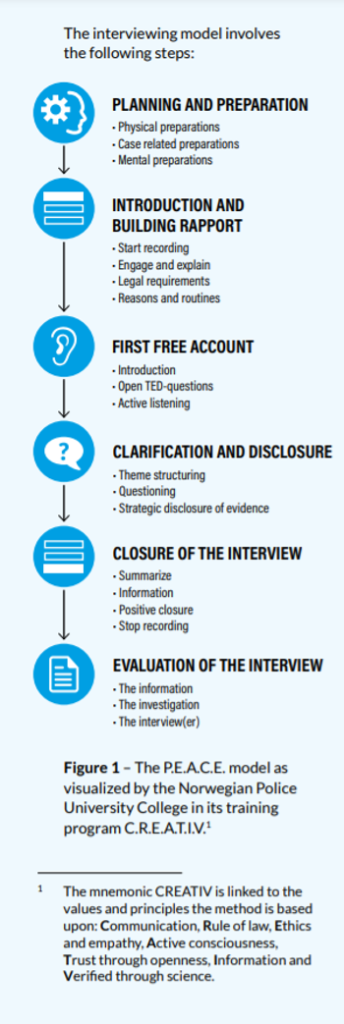
Police Interviewing
Since 2016, CTI has been supporting States to prevent torture and ill-treatment in the first hours of police custody through developing tools, hosting practical training sessions and organising role-plays, on non-coercive interviewing technique, known as “investigative interviewing”.
Irrefutable empirical evidence indicates that the risks of torture and ill-treatment are higher during the initial period of arrest and in the first hours of police custody, during which questioning normally takes place.
Interviewing suspects, victims and witnesses is one of the core tasks of police and other law enforcement officers, as well as (in some jurisdictions) of prosecutors, investigative judges and judicial police. When interviews are lawfully and properly conducted, fairness, efficiency and reliability of criminal proceedings are enhanced, and abuses and wrongful convictions are prevented. Such interviewing also leads to expeditious crime resolution and strengthens the functioning of and trust in the criminal justice system as a whole.
History and efficacy of investigative interviewing
Forensic psychological studies show a clear correlation between interviewer approaches and strategies and the responses of those being interviewed. Investigative interviewing is a method offering an alternative to coercive interrogation, based on scientifically proven means of obtaining reliable, actionable evidence and information through using open-ended questions, empathetic communication and rapport building. Investigative interviewing is supported by neuroscientific studies which have established that stressors (such as intimidation, coercion or torture) severely impair the brain’s memory and cognitive function, increasing the likelihood of false or unreliable recollections and other information.
During the 1980s and 1990s, a series of cases brought to light forced confessions and wrongful convictions in the United Kingdom, leading to an independent evaluation of the Metropolitan Police’s interrogation practices. In the early 1990s, the PEACE model of investigative interviewing was developed as a collaborative effort between law enforcement and psychologists in England and Wales in response to the proliferation of false confessions that resulted from an accusatory style of interviewing. False confessions and subsequent miscarriages of justice have a heavy cost to the State, in terms of fracturing trust in the State, decreasing cooperation with the authorities, and in some cases, large compensation payments to victims.
The Five Stages of the PEACE model of Investigative Interviewing:

- Preparation and Planning: Mental and strategic preparation for evidence gathering, analysis of multiple hypotheses and other case-related preparation to avoid “tunnel vision” and the tendency to attempt to corroborate pre-conceived, unsupported ideas.
- Engage and Explain: Engagement of the interview which includes setting rules of engagement, advising of rights and explaining of the interview process.
- Account: The Interviewee’s full free, uninterrupted account of the events, that is, a recounting of what happened, prompted by the interviewer’s open-ended questions, active listening, follow-up questions, clarifications and strategic disclosure of evidence.
- Closure: Closing of the interview, ensuring mutual understanding of the account given, expression of gratitude for the interviewee’s time, and explanation of next steps.
- Evaluation: Assessment of the information obtained to evaluate whether additional evidence gathering is needed, as well as the interviewer’s performance and provide training and lessons for subsequent interviews.

PEACE in action globally
Investigative interviewing is adaptable to different national contexts, and countries in different regions have developed their own versions of the model. The Norwegian police, for instance, developed the KREATIV model (Communication; Rule of Law, Ethics and empathy Active consciousness; Trust through openness; and Information verified through science), and Indonesia developed POAC (Planning, Organising, Actuating and Controlling).
In October 2016, former UN Special Rapporteur on torture, Juan E. Méndez, in his last report to the UN General Assembly, called for the development of a universal protocol identifying a set of standards for non-coercive interviewing methods and procedural safeguards to be applied, at a minimum, to interviews being conducted by, for example, law enforcement, military, intelligence personnel and other bodies with investigative mandates. A group of non-governmental organisations are currently taking forward an expert-driven process to develop such guidelines.
Interested in the guidelines process?
EXTERNAL LINKS
Association for the Prevention of Torture (APT)
Anti-Torture Initiative – American University Washington College of Law (ATI)
Norwegian Centre for Human Rights (NCHR)
Benefits of investigative interviewing
Interviews that are conducted using investigative interviewing techniques can have the following benefits:
- Avoids resort to mistreatment and torture of suspects, which is prohibited at all times and has been disproven as a reliable means of obtaining reliable evidence and information;
- A systematic gathering of reliable evidence to better direct an investigation;
- Withstands prosecutorial scrutiny of the case file, thereby saving time, money and resources;
- Increases the public’s confidence in the justice system overall;
- Adaptable to different national contexts and can be applied in a variety of interviews;
- Win-win for both law enforcement officers and interviewees, as it protects the interviewers against false allegations of abuse and misconduct.

